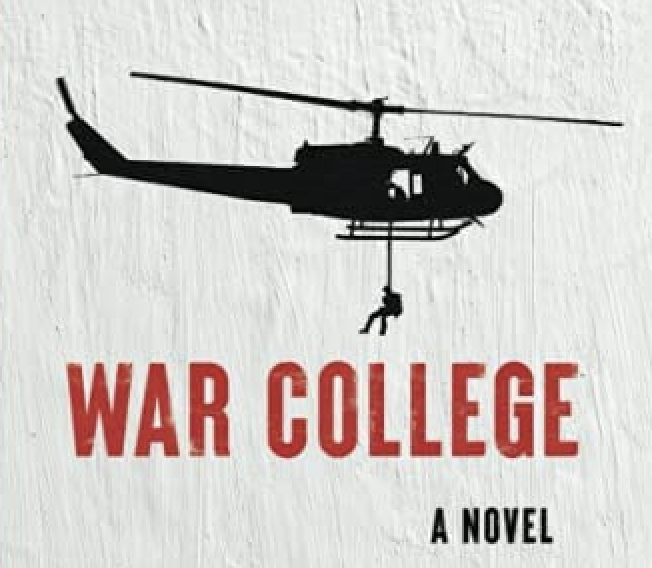
Thomas A. Barnico’s ’77 War College: A Novel follows one Jack Dunne, a Vermont college student, as he navigates his dual identities as a college and enlisted man during the Vietnam War. Although Dunne’s college is an obvious stand-in for Dartmouth, from its Green to a local veteran’s hospital to a building entitled “Administration,” War College is anything but just another nostalgia trip mixed in with some Vietnam themes for seasoning. The novel — and this is a testament to the author’s talent — somehow thoughtfully reflects on America’s Vietnam experience, especially in relation to today’s lack of public leadership, while also capturing the spirit of the all-male New England institution in the very concept’s twilight years.
War College is both Animal House and We Were Soldiers, and yet it never seems ridiculous. The book begins with Dunne visiting his campus on a 10-day leave from Vietnam. From the very first chapter, the reader encounters a central theme of the book: that previous generations of young people had a spirit of self-sacrifice and devotion to a cause that the hippie generation of the 1960s threw off. Barnico establishes Dunne’s father as the prototypical man ‘that they don’t make like they used to.’ The elder Dunne not only served his college as a championship-winning hockey captain who always shook hands with his opponents but also conducted covert operations during WWII and espionage after. From the words of war hero and mentor to Dunne, Colonel Tiemo Turck, the reader learns that the younger Dunne shares his father’s traits—the young college student is the type of man, though once plentiful, that the country needs more of. “I don’t understand much about Vietnam, but if we can’t get more guys like Jack to go,” Turck says, “we don’t belong there at all.”
From this first look at the character of Jack Dunne, Barnico introduces the reader to a panoply of personalities that populate the young soldier-scholar’s life, from his Asgard Hall fraternity brother Thomas “Rocco” Marconi to love interest Clare McUsic and mentors Professor McUsic and President Onion. The book follows these characters as the war halfway across the world reshapes each of their lives. Rocco and his fraternity brothers—“footballers, ruggers, the ROTC guys”—try to survive on a college campus increasingly opposed to overt, athletic masculinity and military service. Claire struggles to reconcile her love for a warrior with her ideological opposition to and protest of the Vietnam War. Simultaneously, the Professor and President Onion, both graduates of the college, fight to preserve an institution that seems no longer capable of producing (or attracting) the veterans and patriots whom they came up with.
Many of the events that unfold next come straight from Dartmouth, from protests on the Green to “big weekends” to a storming of the “Administration” building. Rocco witnesses firsthand, working in the college garage, the class boundaries that underline the controversy behind the draft; his supervisor’s son—a star high-school athlete—passes his medical exam, enlists, and is KIA while Marconi’s classmates consult with lawyers and medical students to receive customized medical disqualifications for the draft. Clare, despite her commitment to the anti-war movement, faces harassment for her relationship with Dunne and for sympathizing with draftees. The elder McUsic and Onion must defeat campus initiatives to eliminate ROTC while also seeking out those few excellent men at the college who are still willing to do their duty.
Moments of unreality do punctuate the otherwise well-written work that is War College. Barnico predicates a significant portion of his book on President Onion taking a personal interest in Dunne because he knew his father. Onion, a former OSS operative, even personally recruits and mentors the student for the military. Nevertheless, the novel more than makes up for this weakness in its social commentary. What the reader sees time and time again through the eyes of the main cast is opposition to the war coming from men who have never seen war but judge those whom have. Instead of mere hippie caricatures, the reader sees in these agitators a certain and understandable desperation. They “stud[y] the Military Code of Physical Regulations with an intensity seldom shown in their undergraduate courses.” They don’t want to die. But, in that, they sin. As Barnico emphasizes throughout the book, others must go in their place. Accordingly, the author does help provide an answer for America’s current diminished state of affairs. After all, it was the generation of young people who let others go in their place, who shouted “We don’t care!” at rallies, who enjoyed college while more dutiful men died, whose life paths did not take a Vietnam-sized detour. They ascended to positions of power. Many still hold them. Unlike Jack Dunne and unlike his father’s generation, however, they still don’t care. Jack Dunne “fulfilled all of [his] obligations”: to his fraternity, college, family, and nation. Those who let others die neither fulfilled their obligations nor even knew what they were. Reading Thomas A. Barnico’s ’77 War College, a reflection on the liminality of both the battlefield and the college quad, the reader realizes that our nation has been far worse off for the dereliction of duty of nearly an entire generation and social class. Perhaps that is the price we deserve to pay.

Be the first to comment on "Animal House Meets Vietnam: Thomas A. Barnico’s ’77 War College"